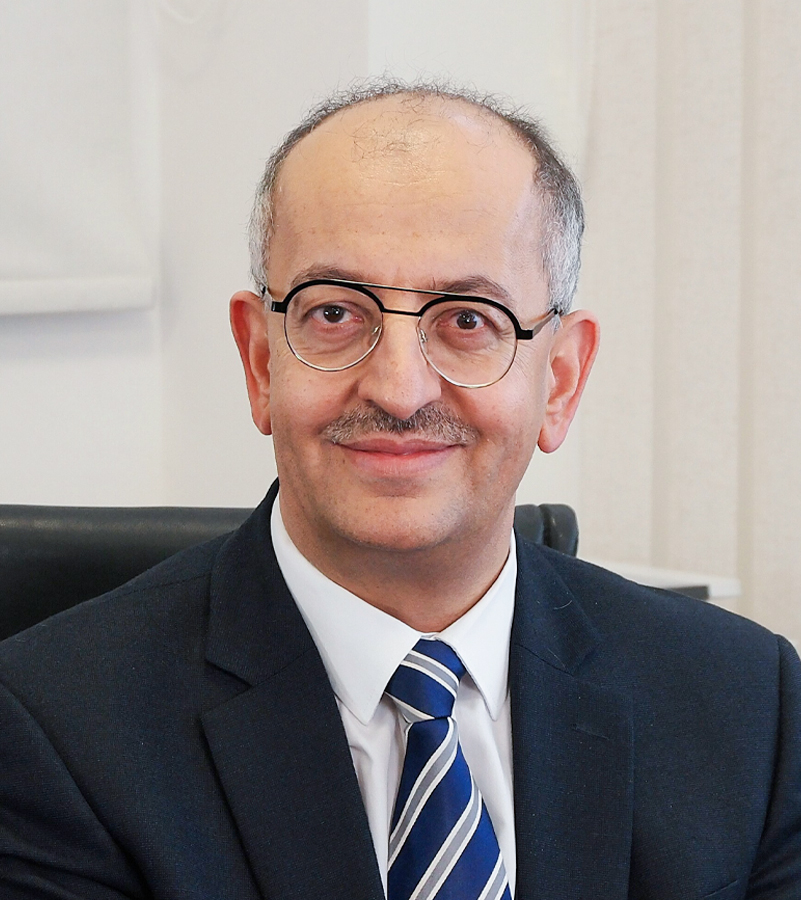"We can ‘turn on a dime,’ adjusting almost monthly as technology advances in industries like health care and manufacturing.”
What are the main factors contributing to KCST’s growth and reputation in higher education?
KCST has, from the start, focused on offering high-tech degree programs aligned with future workforce demands, especially in light of the digital transformation in Kuwait and globally. The institution has made significant investments in state-of-the-art facilities to ensure students receive practical, hands-on experiences and are motivated to achieve excellence.
KCST’s curriculum is rooted in high engineering and technology standards through collaboration with the Indian Institute of Technology Delhi (IIT Delhi). It also enjoys academic partnerships with Bayes Business School of City, University of London (UK), and Bentley University (US). The curriculum features a strong management component, which spans from first year through graduation, and includes courses in economics, leadership, entrepreneurship, finance and project management.
To further prepare students for the industry, KCST offers professional certifications in fields like cybersecurity (including Certified Ethical Hacking, Certified Incident Handling, and Certified SOC Management), as well as certifications in artificial intelligence and robotics. These programs are made possible by KCST’s exclusive Training Cybersecurity Operations Centre—the only one of its kind in a university across the Middle East—and its accreditation as a certified training and testing center by EC-Council.
Additional resources include advanced AI and robotics labs, an MIT-certified fablab, and cutting-edge labs in electronics, computer engineering and communications.
What are the primary academic programs, research initiatives and services that define KCST’s core educational mission?
KCST currently offers three bachelor’s degrees:
- BSc in Computer Science
- BEng in Computer Engineering, with specialization options in Cybersecurity, Artificial Intelligence, and Data Science
- BEng in Electronics and Communications Engineering, with tracks in Internet of Things (IoT), Next Generation Communications and Networking (NGCN), AI in Healthcare (AIH), Renewable Energy Systems (RE), and Oil and Gas Instrumentation (OGI)
KCST is recognized as the most research-active university in Kuwait. According to Scopus (Elsevier), its publication productivity surpasses all other universities in the Middle East and is at least three times the national average in Kuwait. The university’s research foci include nanotechnology, green energy harvesting, medical electronics, cybersecurity, IoT and assistive technologies for special needs.
How does KCST differentiate itself from other universities and institutions in Kuwait and the region?
KCST stands out as the only technology-focused, research-driven, and hands-on-intensive university in Kuwait and potentially the region. This model has yielded tangible success, with 100 percent of its 1,500 graduates employed in either public or private sectors. Over 90 percent of graduates find employment within three months, and many are recruited before graduation.
KCST has established itself in several areas of excellence:
- Cybersecurity: It hosts the region’s first Cybersecurity Operations Centre, endorsed by EC-Council and the British and US Embassies.
- Energy Harvesting: The university developed Kuwait’s first stand-alone solar energy harvesting room in partnership with Australian Alpha Solar Company, with support from the British Embassy.
- Nanotechnology: Its lab is equipped for fabricating and analyzing piezoelectric nanomaterials.
- AI and Robotics: With a focus on assistive technologies, these labs further cement KCST’s commitment to innovation.
What are KCST’s strategies for expanding its student base, academic partnerships and research collaborations locally and internationally?
In just five years since its opening in 2016, KCST reached its full capacity of 2,000 students, underscoring the demand for its programs. Expansion plans are now in progress to double the campus size, adding new research and teaching facilities, student spaces and a full indoor sports center.
Academically, KCST remains committed to its tech-centered mission. Future plans include launching degree programs in civil and environmental engineering, as well as electrical and renewable energy engineering. The institution also intends to open Kuwait’s first digital business management school in collaboration with Bayes Business School, offering programs in digital finance, fintech, digital business and digital marketing.
KCST maintains active research collaborations with several respected institutions, including the German Jordanian University (Jordan), Egypt-Japanese University of Science and Technology (Egypt), Cardiff University (UK), Bentley University (US), and Qatar University.
How does KCST foster a strong academic environment, support student success and contribute to the broader community?
KCST is a hub for academic, scientific and cultural engagement. In the 2024-25 academic year alone, the university hosted over 50 events, including international conferences, competitions, hackathons, seminars and cultural and sports activities.
Signature events include:
- The Cybersecurity Education and Research Conference (CERC), in partnership with the British Embassy, Kuwait National Cybersecurity Centre, and Kuwait University
- The International Conference and Forum on Assistive Technologies for Special Needs (ATSN), with the United Nations, UNESCO and ALECSO (Arab League Educational, Cultural and Scientific Organization), under the patronage of Kuwait’s Minister of Social Affairs
- The International Conference of Teaching English as a Foreign Language, in partnership with TEFL
- The Symposium on Smart, Sustainable and Secure Internet of Things (S4IoT), in collaboration with Springer


















